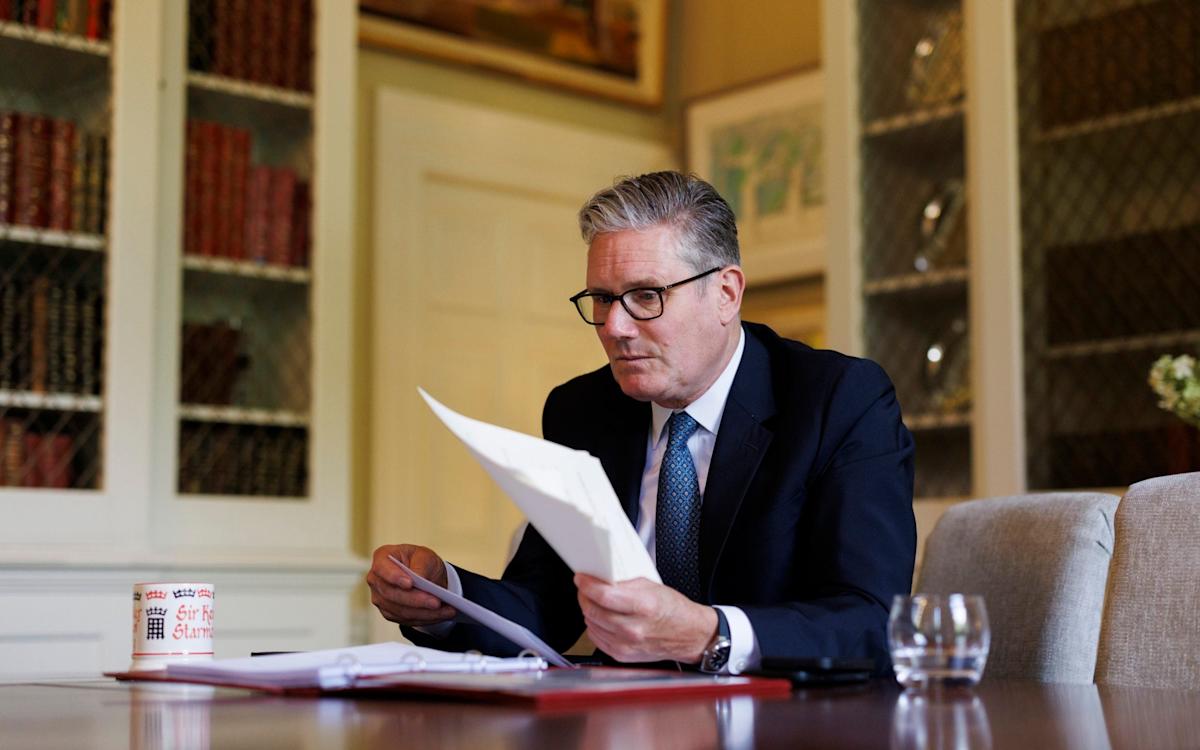Sir Keir Starmer’s reshuffle has sparked uncertainty on the markets – Simon Dawson /Crown
Lord O’Neill, the former Treasury minister and City grandee, has fired a warning shot over the state of the bond market as Britain’s borrowing costs surged to a 27-year high.
The ex-Goldman Sachs chief economist said he was “bothered” by the rising cost of UK gilts, adding that Rachel Reeves must tackle the ballooning benefits bill at her Budget this autumn in order to resolve Britain’s fiscal crisis.
His comments came as the pound fell sharply on Tuesday and UK borrowing costs surged to hit their highest level since 1998 after Sir Keir Starmer sidelined the Chancellor in a No 10 reshuffle.
Figures from the Office for Budget Responsibility suggest the increased cost of gilts, if maintained, could add £6bn to the Government’s interest payments by the end of the decade.
Lord O’Neill said there had been “a slow drip, drip, drip to further deterioration” in the bond market “which is not a good sign”.
He added that financial markets were now waiting for action from the Government after they capitulated to Left-wing Labour backbenchers in July over curbs to welfare spending.
Lord O’Neill told BBC Radio 4’s PM programme: “Ever since the climbdown on welfare reform I’ve been watching the markets more closely. As the summer’s gone on I’ve got more bothered.
“On days where US and German bond yields go down, ours don’t go down as much. On days where theirs go up, ours tend to go up more than theirs.
“There are three or four really big things which have to be tackled if we’re going to solve our fiscal challenges. I would put into that the triple lock, the property market, welfare reform and much more focus on getting better productivity and returns out of how much money we keep piling into the NHS.
“I think they’re quite focused on the latter, but the other three we just don’t really know. I think the markets are at the point where something needs to happen on that big stuff.”
The crossbench peer’s comments are expected to carry weight across party lines as he became one of the world’s best-known economists after coining the widely adopted term Brics to refer to rising economic powers including Brazil, Russia, India and China.
The pound was the worst performer among the world’s major currencies on Tuesday, dropping by as much 1.5pc against the dollar to around $1.33 and 0.6pc against the euro to €1.15.
The yield on 30-year UK gilts – a benchmark for the cost of servicing Britain’s national debt – climbed 0.05 percentage points to 5.69pc, while gold rose to a record high to $3,528 an ounce, as investors fled to safe haven assets.
While borrowing costs are rising around the world, it is unusual for a currency to weaken at the same time.
Story Continues
The market moves increase the pressure on Sir Keir Starmer and Ms Reeves ahead of this autumn’s make-or-break Budget.
Economists have warned that Ms Reeves faces a fiscal black hole of as much as £50bn in the autumn. Meanwhile, growth remains weak.
While borrowing costs are high, the appetite for UK government debt remains strong. The Treasury was on Tuesday poised to raise a record-breaking £14bn through the sale of 10-year gilts after attracting significant interest from investors.
It suggests investors still see UK debt as attractive despite the country’s fiscal woes, as rivals on the continent like France are gripped by their own crises.
Chris Beauchamp, the chief analyst at stockbroker IG, said rising borrowing costs “complicate matters enormously for the Government, in turn signalling that tax rises are coming in the autumn Budget”.
Borrowing costs have been steadily rising for weeks, but the latest increase comes after the Prime Minister appointed three financial experts to his top team on Monday, a move seen as undermining Ms Reeves after a series of policy reversals and missteps at No 11.
Sir Keir notably poached Darren Jones, Ms Reeves’s deputy, to the new role of chief secretary to the Prime Minister.
Sir Keir Starmer with his new chief secretary, Rachel Reeves’s former deputy Darren Jones – Simon Dawson / No 10 Downing Street
Yvette Cooper, the Home Secretary, on Tuesday insisted that Ms Reeves had not been “sidelined”, claiming the situation was “quite the reverse”.
She said: “I think the Prime Minister and the Chancellor have always worked extremely closely together and continue to do so.”
Mohamed El-Erian, the chief economic adviser at Allianz, said the UK was behaving “similar to what is more usual for developing countries, highlighting an already difficult fiscal and growth outlook”.
Global stock markets also tumbled on Tuesday with the FTSE 100 closing down 0.9pc. Wall Street was hit by concerns over US debt and fears of an AI bubble, with the S&P 500 down by about 1pc on Tuesday evening and the Nasdaq falling around 1.2pc.

